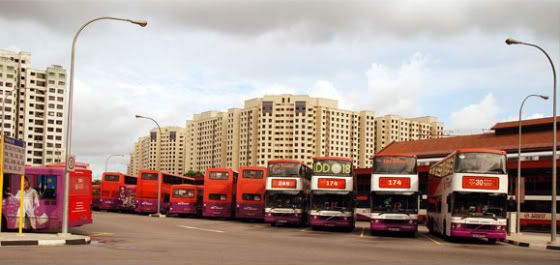Singapore Angle

Boon Lay Bus Interchange
In the run-up to the coming increase in public transport fares, I expect there will be much online discussion. Given the increased price of oil, it will be difficult for the Public Transport Council to say no to the operators as that the relevant legislation obliges them to take into account “the need for the applicant to remain financially viable.” As such it seems timely to offer some brief comments on Mr Ngiam Tong Dow’s recent call for the Public Transport Council to take “a sabbatical” (“A Mandarin Speaks His Mind“, TODAY 2006-07-05).
While I admire Mr Ngiam for speaking his mind (see also his interviews with Susan Long: “Stop dancing to the tune of the gorilla” and “Singapore bigger than the PAP“), I’m not entirely sure that the possible alternative to the current PTC system will find favour with the current regime.
Mr Ngiam has suggested that public transport operators be freed to set their own prices. [Aside: By implication, government bodies should also be obliged to withdraw from commercial activities in this area e.g. LTA might have to divest its ownership of EZ-Link).] No doubt, free market libertarians will support this and I look forward to their retorts to my reservations.
Firstly, there is no functioning competitive market to speak of. Both public transport companies (SMRT and SBS) have effective monopoly power in their respective sectors of the market and offer complementary rather than substitute services; prices have tended to be sticky upwards (i.e. they go up easily up but rarely ever come down) and removing the PTC from the equation might exacerbate this. I believe reform has to be more holistic and needs to encompass a wholescale marketization of public transport provision, including looking at potential barriers to entry and an alternative regulatory regime that can cope with the messiness of competitive behaviour, in order not to be counter-productive.
Secondly, an alternative regulatory regime will still have to balance producer and consumer/public interests but will not have recourse to its current mainstay of price control. Surely the public transport companies will be aware that current minimalist regulations will probably be replaced with more complex metrics such as basic service requirements (and penalties for non-fulfillment), disability access, national security and public safety etc. etc. Thus although government may withdraw, it comes in again at another level. Costs of compliance will probably increase and the scope of compliance is also likely to be sticky upwards.
Thirdly, the regulatory regime that replaces the current command economy style one might generate political effects that the current regime is unlikely to tolerate. If we move towards a complaints-based system (e.g. UK’s Office of Fair Trading, Competition Commission) from consumers and companies, this will give added impetus to civil society groups to organize, mobilize and exercise voice. Given how civil society groups built around socio-economic, environmental or religious issues eventually grew into full-fledged democratisation movements in Eastern Europe, South Korea and Taiwan, I expect that the authorities will want public transport fares to remain within the remit of what Prof Chan Heng Chee called the “administrative state” rather than allow to become an issue for contestation in civil society and politics.
Thus I don’t believe that Mr Ngiam’s suggestion will be put into practice. This is probably going to be one of those proposals that will never get mentioned again (e.g. Dr Tony Tan’s 1999 floater about replacing government scholarships with tuition loans).

